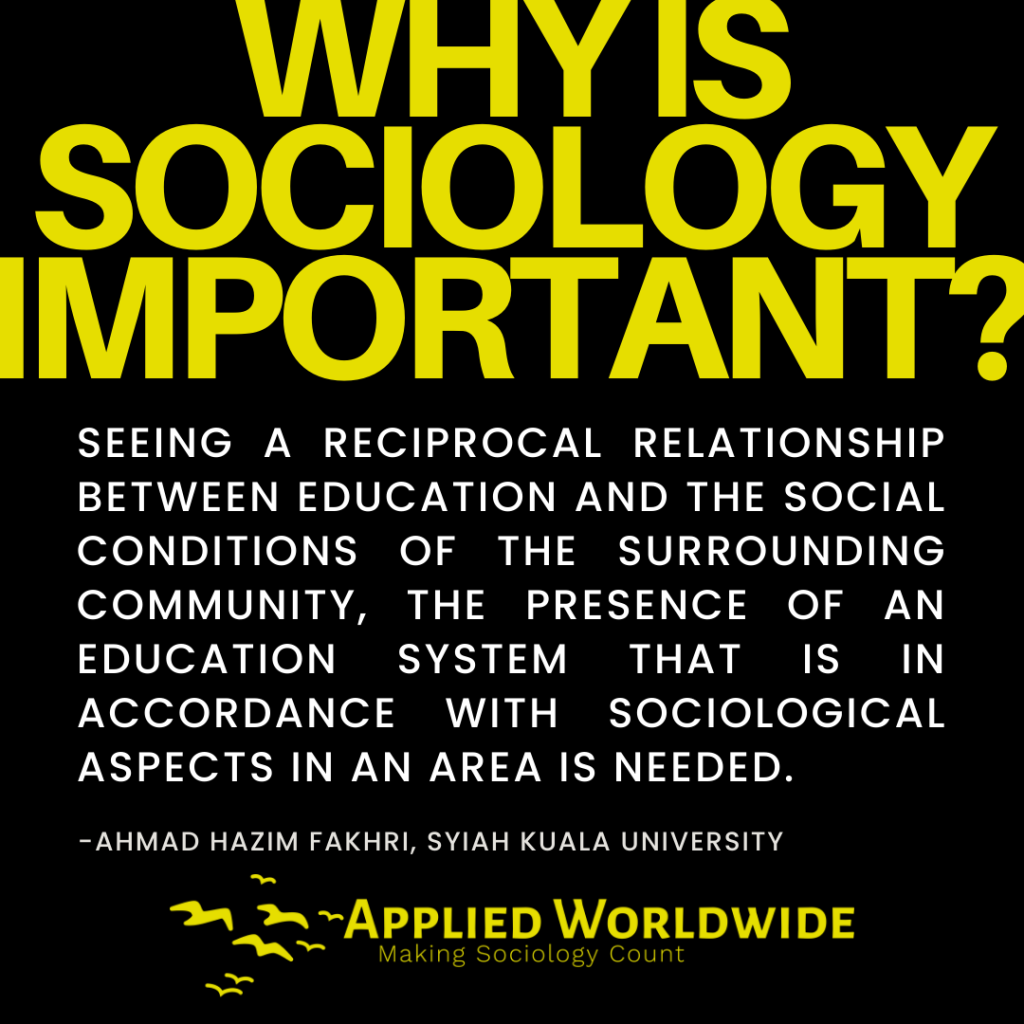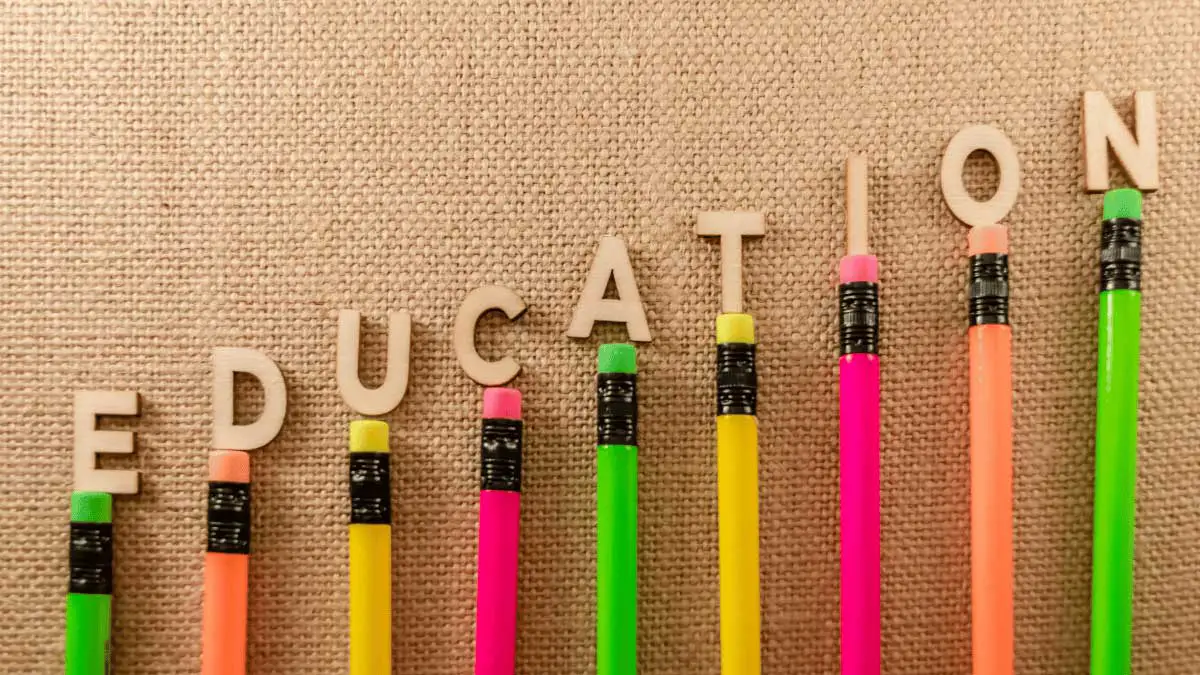Editorial Note
Thank you to our generous sponsors, Sociologists for Women in Society, Center for Equity Education, Azama Development Foundation, and Sociological Practice & Public Sociology (SPPS) – American Sociological Association (ASA) for helping us make Applied Worldwide’s 2023 “Why is Sociology Important?” student essay competition a success!
This essay on the importance of the sociology of education was published on behalf of Applied Worldwide’s 2023 Global Student Essay Competition. For the 2023 competition, we awarded 16 student essayists across eight countries and one US territory and will be sharing each winning essay in our “Why is Sociology Important?” essay collection.
This sociology essay was written by Ahmad Hazim Fakhri, a fifth year sociology student at Syiah Kuala University in Indonesia and earned a 3rd place prize in the competition.
Realizing an Educated World Community through the Sociology of Education, Ahmad Hazim Fakhri
On my campus, students with a background in sociology are still looked down upon. This is because the job prospects for sociologists are unclear and most graduates with sociology degrees are unemployed. However, after I took a sociology course in my major and had a friend majoring in sociology, I could see the importance of sociology in all fields of knowledge, especially in the world of education.
Education is one of the foundations and reflections of a nation. Education is the source of a country’s progress because through education the quality of human resources (HR) of a nation can be developed (Muhardi, 2004). To meet the demands of the times, it is necessary to improve the quality of education. The quality of education is the compensation or ability of educational institutions to empower and manage educational resources, which are used to develop students’ learning abilities as optimally as possible. (Zahroh, 2014). If the quality of education in a country is good, quality human resources will be created. However, if the quality of education is not good, the human resources produced will have low competitiveness and productivity.
Besides that education is a place to build character for every individual. The main goal of character education is to build a strong nation, where people have noble, moral, tolerant, and cooperative people. Based on the importance of education for each individual, the role of the social sphere and social institutions is very instrumental in determining the quality and goals of education itself.
As a student majoring in education, I have various experiences in teaching students in front of the class. I have a responsibility in providing all the knowledge I have to students when I teach in class. However, I often get questions from my students regarding the knowledge they are studying. One of the questions they asked me was whether the knowledge they learned would be implemented in the real world. The role of educational sociology as an implication of the situation from the student’s question. Ever since I attended the sociology of education course on campus, I realized that the teaching process is not just a matter of transferring knowledge. As a teacher, I have a mission to prepare students to be able to enter and live in society. So that after completing their education, they will apply what they have learned in school in life.
Each student is aware of this need and tends to be more critical and wants to be involved in his or her learning. When I pay more attention to this, as a teacher I have to make sure that what they learn can be useful for them when they live in society later. Through education, I as a person who deals directly with students play an important role in the sustainability of social dynamics in society.
Through formal educational institutions such as schools, educational sociology plays an important role in the social activities of students. By studying the sociology of education, as a teacher I am required to be able to understand more about how to communicate with students from diverse backgrounds. Socialization is a process of individual learning about the culture that is currently developing in society so that students can act as members of society. Through the sociology of education, I, as a teacher, also play a role in imparting skills to students so that later they can be useful and have a role in society.
Understanding the Sociology of Education
Humans are social creatures. In daily life, every human being needs the contribution and help of other human beings. These connections and attachments will later form a social interaction. In the world of education, social interaction is studied in a field of knowledge called the Sociology of Education.
According to (Karsidi, 2005), the sociology of education is a science born of social conditions that influence how educational activities are carried out in an environment. One of several scopes of sociology is concerned with matters related to social interaction that can be found in the context of education. If we look at the definition again, social interaction is a relationship that occurs both between individuals, groups, and individuals with groups. In education, I see that social interaction always occurs, especially in teaching and learning activities. In essence, humans are born as social beings. Along with its growth, humans will be more actively involved in a wider social sphere.
The sociology of education also requires sensitivity in viewing values, institutions, culture, and also the trend of reality towards the world of education in society. Not only that, but the sociology of education also reviews how the world of education compiles learning curricula that are relevant to society, the role of teaching staff in shaping students is also discussed in the sociology of education.
Likewise with the students I teach. They are born in the smallest unit of society, namely the family. In this case, with the increasingly complex social environment, the social knowledge they get from home will not be enough for them. Therefore schools exist as a place for every child to hone themselves by learning and interacting with others. Therefore schools exist as a place for every child to hone themselves by learning and interacting with others. It can be concluded that the condition and quality of education in a region have a reciprocal effect on the community.
The Benefits and Goals of Sociology in the World of Education
As a teaching staff, I am aware of the importance of educational institutions to society, especially for education itself. Because in educational institutions such as schools a generation is being formed to become quality human resources. Seeing a reciprocal relationship between education and the social conditions of the surrounding community, the presence of an education system that is in accordance with sociological aspects in an area is needed.

The role of the sociology of education in the formation of student character is implemented through teachers who are required to insert character education listed in the lesson plan. In educational sociology material, there is the formation of student character contained in the sociology learning syllabus. Basic competency inserts include those related to deepening religious values, applying basic concepts of sociology, studying existing social phenomena, understanding social relations between individuals and groups, applying sociological methods, upholding harmony, and growing individual awareness. The values taught in the sociology of education serve to foster an attitude of honesty, discipline, responsibility, caring, cooperation, cooperation, tolerance, peace, courtesy, responsiveness, and proactivity. The application of these values in the classroom can take the form of, for example, religious values can be carried out by carrying out religious activities, cooperation values can be done by cleaning the classroom or pickets, and disciplinary values can be by arriving on time. These values are expected to be firmly embedded in students who will later become individual characters. On the other hand, the Sociology of education aims to analyze the process of socialization of children, both in the family, school, and society.
From the description above, I can conclude that the role of the sociology of education in socialization can be carried out through the role of the teacher as an educator who has previously studied the sociology of education. While the character of students will be formed through the syllabus and learning plans that are arranged and made as well as possible, which are then applied daily. Therefore, the application of a sociology-based curriculum needs to be implemented, to create a quality education system in forming superior generations in the future.
References
- Karsidi, R. (2005). The Sociology of Education. Surakarta: Sebelas Maret University.
- Muhardi. (2004). EDUCATION’S CONTRIBUTION TO INCREASING THE QUALITY OF THE INDONESIAN NATION. Bandung Islamic University, 20(4), 14.
- Zahro, Aminatul. (2014). Total Quality Management Management Theory & Practice To Boost Education Quality. Ar-Ruzz Media, 28.
Meet our 2023 Global Student Essay Competition Sponsors!

Sociologists for Women in Society is a nonprofit professional feminist organization dedicated to:
- Encouraging the development of sociological feminist theory and scholarship
- Transforming the academy through feminist leadership, career development, and institutional diversity
- Promoting social justice through local, national, and international activism
- Supporting the publication and dissemination of cutting edge feminist social science

The Center for Equity Education is a 501c3 nonprofit dedicated to providing quality and affordable DEI&A, discrimination, harassment, and sexual harassment prevention and education services.

Azama Development Foundation is a Non-governmental organization that actively works towards the development of youths and women to be self-reliant and productive. Our mission is to transform the lives of youths and women from all over Africa to be self-reliant and productive actively contributing to national economy, education and development, thereby eradicating poverty, illiteracy and lack of enlightenment in the region.

Sociological Practice & Public Sociology (SPPS) promotes the use of sociology to inform research, practice, and public policy beyond academia. In short, we focus on Making Sociology Actionable. SPPS focuses on public and applied sociology as a section under the American Sociological Association (ASA).







